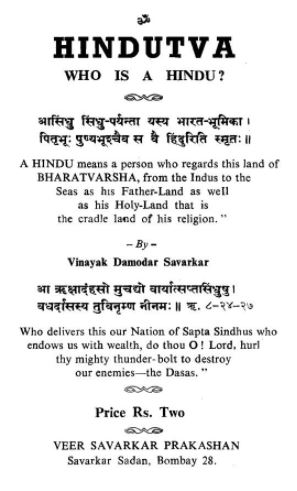‘Hafiz And The Religion of Love Poetry’ PDF Quick download link is given at the bottom of this article. You can see the PDF demo, size of the PDF, page numbers, and direct download Free PDF of ‘Persian Love Poetry’ using the download button.
Hindutva: Who Is a Hindu PDF Free Download

Essentials Of Hindutva
What is In a name?
We hope that the fair Maid of Verona who made the impassioned appeal to her lover to change a name that was ‘nor hand, nor foot, nor arm, nor face, nor any other part belonging to a man’ would forgive us for this our idolatrous attachment to it when we make bold to assert that, ‘Hindus we are and love to remain so!’
We too would, had we been in the position of that good Friar, have advised her youthful lover to yield to the pleasing pressure of the logic which so fondly urged ‘What’s in a name?
That which we call a rose would smell as sweet by any other name!’ For, things do matter more than their names,
especially when you have to choose one only of the two, or when the association between them is either new or simple.
The very fact that a thing is indicated by a dozen names in a dozen human tongues disarms the suspicion that there is an invariable connection or natural concomitance between sound and the meaning it conveys.
Yet, as the association of the word with the thing it signifies grows stronger and lasts long,
so does the channel which connects the two states of consciousness tend to allow an easy flow of thoughts from one to the other, till at last, it seems almost impossible to separate them.
And when in addition to this a number of secondary thoughts or feelings that are generally roused by the thing get mystically entwined with the word that signifies it, the name seems to matter as much as the thing itself.
Would the fair Apostle of the creed that so movingly questioned ‘What’s in a name?’ have liked it herself to nickname the God of her idolatry as ‘Paris’ instead of ‘Romeo’?
Or would he have been ready to swear by the moon that ‘tipped with silver all the fruit tree-tops,’ that it would serve as sweet and musical to his heart.
(IV) But as destiny would have it, the unexpected happened and the Savarkar brothers were released from the Cellular Jail after almost twelve years of transportation and were sent back to India but they were again put behind bars.
Back closed. Indian jails!
In those days there were also many Congress political prisoners for short terms in Indian jails, where Veer Savarkar was transferred from time to time.
Congress political prisoners were given special facilities which included writing material.
Due to this fact, despite being treated as a revolutionary prisoner and kept apart under special restrictions, he found it possible to get hold of real paper and pencils from time to time!
He immediately wrote this treatise on ‘Hindu-iva’.
It could not be detected by the prison authorities and through various secret channels parts of it were cleverly smuggled through those Indian prison walls until finally the whole work reached its destination.
Soon after this in 1923 the first edition of this book on Hinduism was published by Shri. V.V.Kelkar,B. A., L.L. B., Advocate, Nagpur. Since Veer Savarkar was still in jail, the author’s name was not published.
This book was published under ‘Non-de-plume 4 Maratha’.
Even though it was deprived of the aura it would have invested if it had been associated with the name of its distinguished author, the book was greeted with boundless enthusiasm by the Hindu unionist masses.
the late Lala Lajpatrai, Pt. Madan Mohan Malaviya and several others hailed it as the most original and scholarly contribution to the Hindu Idealogy.
The definition acted as does some scientific discovery of a new truth in re-shaping and re-co-ordinating all current Thought & Action.
Torn, broken up and confined in water-tight compartments, the Hindus themselves had come to doubt if they were a homogeneous people at all.
To them the book came as a veritable Revelation! For it revealed to them their real National-Self, in which and through which consciously or unconsciously they lived and moved and had their organic Being. At its touch arose an organic order where a chaos of castes and creeds ruled.
The definition provided a broad basic foundation on a bed-rock on which a consolidated and mighty Hindu Nation could take a secure stand.
It was later on adopted by the Hindu Mahasabha itself as its authoritative definition of Hindutva.
Out of numerous tributes paid to the author of this book we cull and cite only two. Wrote the late Swami Shraddhanandaji
हिंदुत्व: हिन्दू कोन है ? Read In Hindi
| Writer | Veer Savarkar |
| Language | English |
| Pages | 159 |
| Pdf Size | 6.3 MB |
| Category | Literature |
| Credit/Sources | archive.org |
Download 1923 original book PDF, Click Here (5 MB)
Relatead PDFs
मोपला: मुझे इससे क्या? PDF In Hindi
Hindutva: Who Is a Hindu Book PDF Free Download
